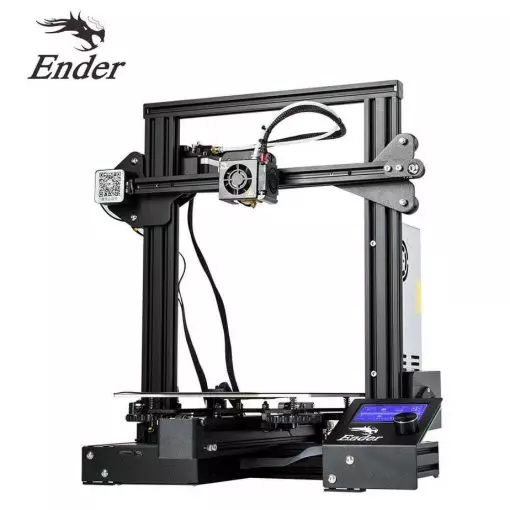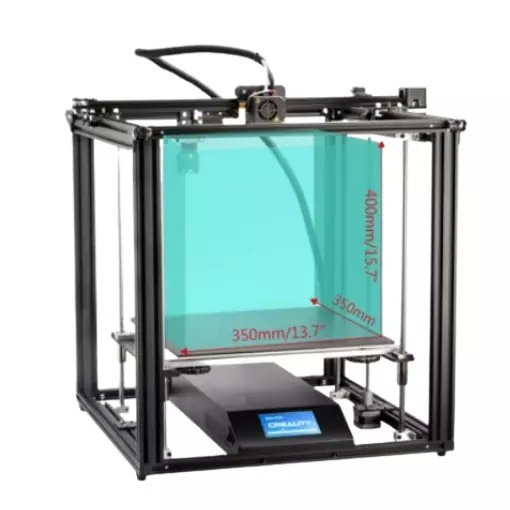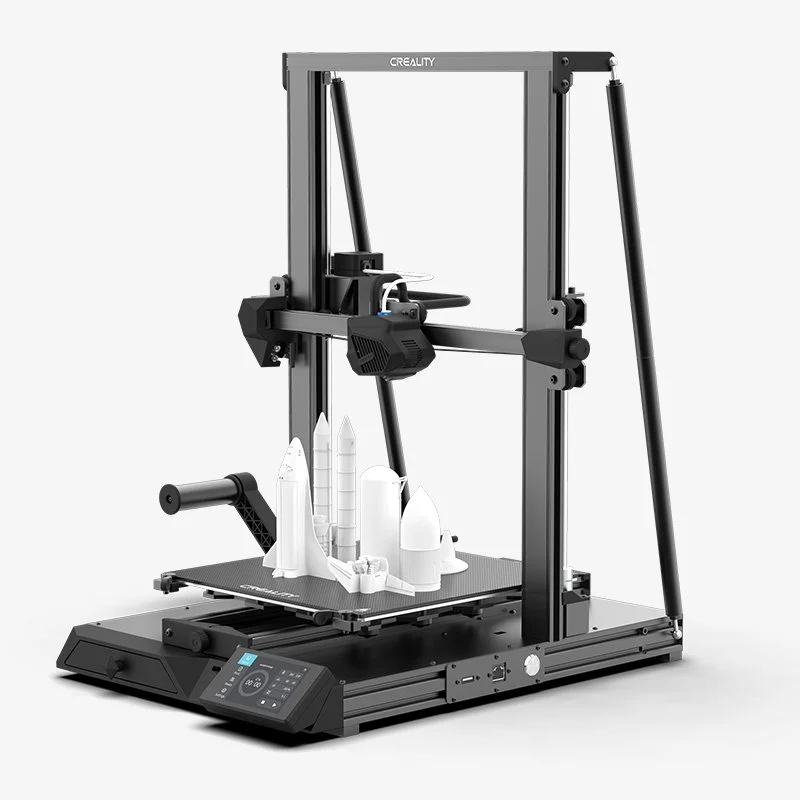Compare Ender 3 vs Ender 5 Plus vs CR 10 Smart
Comparison between the best 3D printers
Choose the best 3D printer at the best price. The cheapest 3D printers are here.
Buy a 3D printer here with 3D Fila.
 |
 |
 |
|
| Model | Ender 3[BUY Ender 3] |
Ender 5 Plus[BUY Ender 5 Plus] |
CR 10 Smart[BUY CR 10 Smart] |
| Printing Material | Filament | Filament | Filament |
| Estimated price | $210,00 | $599,00 | $520,00 |
| Fabricante | Creality 3D | Creality 3D | Creality 3D |
| Release Year | 2018 | 2019 | 2021 |
| Print Volume [mm] | 220x220x250 | 350x350x400 | 300x300x400 |
| Printer Size [mm] | 440x440x465 | 632x619x666 | 578x522x648 |
| Weight [kg] | 6,62 | 18,2 | 14 |
| Power Loss Recovery | NO | YES | YES |
| Enclosed printer | NO | NO | NO |
| Bed Leveling | Manual | Automatic | Automatic |
| Filament End Sensor | NO | YES | YES |
| Bed type | Heated | Heated | Heated |
| Power supply system | Bowden | Bowden | Bowden |
| Standard nozzle | 0,4 | 0,4 | 0,4 |
| Maximum Nozzle Temperature [°C] | 255 | 260 | 260 |
| Maximum Bed Temperature [°C] | 110 | 100 | 100 |
| Maximum printing speed [mm/s] | 180 | 180 | 200 |
| Filament holder | YES | YES | YES |
| Camera for supervision | NO | NO | NO |
| Recommended filaments | PLA, TPU, ABS, PETG | PLA, TPU, ABS, PETG | PLA, PETG, Tritan, Flex, ABS |
| Recommended slicers | Cura, Simplify, Slic3r | Cura, Simplify, Slic3r | Cura, Simplify, Slic3r, IdeaMaker |
| Maximum Resolution [mm] | 0,1 | 0,1 | 0,1 |
| Processor | 8 bits | 32 bits | Processador ARM STM32F103 RET6 CPU |
| Display | Mono | Touchscreen TFT 4,3'' | Display touchscreen 4,3'' |
| Power Supply | 24V / 270W | 24V / 504W | 110/220V / 350W |
| Connectivity | SD / USB | SD / USB | SD / USB / Wi-Fi |
| Operating systems | Windows, Mac, Linux | Windows, Mac, Linux | Windows, Mac, Linux |
| Date of registration in the system | 2021-04-13 | 2021-04-14 | 2022-11-04 |
| Release date | 2018 | 2019 | 2021 |
| Extra features | The Ender 3 V1 is a DIY assembly 3D printer, a sales leader since 2017, standing out for its cost-benefit. With a wide printing capacity, it has a CNC machined structure for precision and stability. It offers high-precision prints with low noise, thanks to its innovative V-profile and pulleys. It has a self-adhesive magnetic platform for easy removal of models and excellent adhesion. The Ender 3 heats up quickly, reaching 100°C in 5 minutes, ideal for agile prints. It includes protection against power failures, allowing you to resume printing after interruptions, saving time and material. | The Ender 5 Plus offers a large print volume (350x350x400 mm) and fast assembly. It includes a BLTouch sensor, but with range limitations. It stands out for its dimensional accuracy, although it requires adjustments to the slicer settings. Despite the noise, its integrated design saves space, and includes features such as a filament sensor and power resumption. Ideal for large projects, it requires refinement in the settings for high-quality prints. | The Creality CR-10 Smart stands out for its stability, with a dual Z axis and additional supports, minimizing oscillation in high prints. Its redesigned hotend offers better cooling, expanding the range of usable materials. The glass printing surface, with automatic leveling, facilitates the adhesion and removal of parts. Includes Wi-Fi / LAN connection and automatic shutdown after printing, adding convenience and efficiency. It features an effective single-gear extruder and an intuitive touchscreen interface, despite some firmware issues. |
| Support for multiple colors and materials (AMS and CFS) | NO | NO | NO |
Notes * |
|||
| Cost-benefit | 6 / 10 | 6 / 10 | 6 / 10 |
| Hardware | 0.5 / 10 | 2 / 10 | 2.4 / 10 |
| Screen | . | . | . |
| Print volume | 3 / 10 | 4 / 10 | 4 / 10 |
| Performance | 1 / 10 | 1 / 10 | 1 / 10 |
| [BUY Ender 3] | [BUY Ender 5 Plus] | [BUY CR 10 Smart] |
Conclusion |
| In conclusion, the comparison of the three 3D printers—Ender 3, Ender 5 Plus, and CR-10 Smart—highlights distinct advantages and considerations based on specific user needs and budget constraints. The Ender 3 emerges as the most cost-effective option, providing decent performance for hobbyists and beginners who prioritize affordability without compromising on essential features such as heated beds and a substantial print volume. Despite its manual bed leveling and lack of advanced features like power loss recovery and filament sensors, it remains a popular choice for those starting in 3D printing. On the other hand, the Ender 5 Plus caters to users looking for a larger print volume and more advanced capabilities, such as automatic bed leveling and a filament sensor. While it commands a higher price, this model is suited for users who engage in larger projects and need additional reliability features, though it may require more calibration for optimal results. Lastly, the CR-10 Smart stands out with impressive stability and a dual Z-axis, making it ideal for high-quality prints with various materials. Enhanced by features like Wi-Fi connectivity and an intuitive touchscreen, it adds convenience for more experienced users who demand precision and ease of use. However, its higher price reflects its advanced capabilities, which may be more than what beginners require. Ultimately, the choice among these models should be guided by the user's experience level, project requirements, and budget, with the Ender 3 offering great value, the Ender 5 Plus providing a good balance between size and features, and the CR-10 Smart excelling in quality and advanced functionality. |

